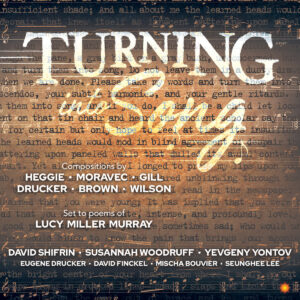
CD Review: Musica Solis’ ‘Turning into Song’
By Bob DieschburgNo doubt Musica Solis’ newest release is a labor of love initiated in 2010 by writer and musical scholar Lucy Miller Murray whose well curated selection of 15 of her own poems lies at the very heart of “Turning into Song.”
Thematically, they are inspired by the likes of Paul Verlaine and French writers from the Symbolist orbit. Miller Murray shares a predilection for puns, irony, and unusual metaphors (“I have held my days like beads / Strung from space to space”). I personally appreciated the inclusion of a cycle modeled upon “Three Statues in the Metropolitan Museum,” rehashing the theme known as ekphrasis, or literary description of artworks. This is very much in the vein of W. H. Auden.
The poems have many merits in themselves; yet they gain three-dimensionality only against the backdrop provided by contemporary composers Jeremy Gill, Eugene Drucker, Paul Moravec, Michael Stephen Brown, Jake Heggie, and Richard Wilson.
The musical execution was entrusted to David Shifrin on the clarinet, Yevgeny Yontov on the piano, and Texas-based mezzo-soprano Susannah Woodruff.
About Words and Music
Titled “Three Songs about Words” the opening section by Jeremy Gill is a very layered, witful mimicry, translating the mention of “long crescendos” and “subtle harmonies” in “Please Take my Words” into their musical equivalents.
The clarinet is the real driver of the melody with its undulating motions disquietingly stirring the atmosphere of “On Hearing a Very Famous Man Speak Profoundly.” In the liner notes, Miller Murray stresses the sarcasm of the composition.
Similarly, in “Words,” the musical effect rests on the contrast between the mezzo’s exhortation to “listen” and “be silent,” on the one hand, and Gill’s almost onomatopoeic use of instruments on the other.
Eugene Drucker, who graduated from Columbia and the Juilliard School, plays in track “Of Troubled Times,” and is the only track on the album featuring a cello and violin. The piece is harrowing though short – less than two minutes long – and punctuated by the parlato markings of the poem’s last three lines.
The prevailing tone of disquiet and unrest, though slightly more ambiguous perhaps, continues in Paul Moravec’s “I Have Held my Days like Beads” and “Oh, Poor Words that Sing of Love.” Both are in minor keys. His “Love Leaps along in Crooked Lines” with its fast pace and syncopated rhythms may be the most cheerful tune – for want of a better word – of an album which seems to dwell on ambivalence and a permeating sense of anxiety throughout.
Therefore, it comes as no surprise that Jake Heggie, best known for his 2010 opera “Moby-Dick,” reprises the aforementioned themes in “Ode to Joy.” However through its chromatic shifts, this drifts away from the elatedness of traditional odes, not to mention the homonymous piece by Schiller and Beethoven.
The release concludes with three songs by Richard Wilson. They are atonal and cerebral, yet they have a sense of lyricism particularly adapted to “Words and Music: An Argument.” The latter is a somewhat ironic and no less stilted disputation, as in Classical Antiquity, between mezzo-soprano and baritone about the essence of poetry as an art.
American Art Song Renewed
It is the initially described cycle “After Three Statues in the Metropolitan Museum” which I liked best: both for the eeriness of the soundscape and its wonderfully subtle translation of the text into song as when the line of “cannonballs for war” coincides with the foreboding of the phrase’s stunningly low tessitura.
The playing of Shifrin, Yontov, and – for track four – Drucker and Finkel is clear, precise, and expressive throughout. It is also supported by very good acoustics and sound engineering. In Susannah Woodruff, however, I did not always find the congenial interpreter. I wished this album had some hardness in her tone invariably shone through the otherwise warm and honeyed timbre of her voice.
“Turning into Song,” therefore, is not an unmitigated success. However, it asserts itself within the renewed tradition of American art songs which the isolationary times of the Covid years seem to have fostered more than ever. The result is worth a listen though competition, including from major labels, is fierce.


